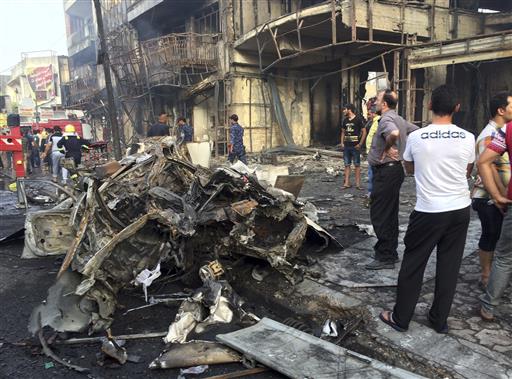Bloodbath and mayhem

Iraqi security forces and civilians gather at the site after a car bomb at a commercial area in Karada neighborhood, Baghdad, Iraq, Sunday, July 3, 2016. Bombs went off early Sunday in two crowded commercial areas in Baghdad. AP File Photo
IN THE aftermath of the terror attacks in Paris in November 2015, the French tricolor bloomed on Facebook as millions of people worldwide expressed sympathy for the 129 people who died, and for a universally beloved city scarred by violence. Five months later, similar attacks occurred in Brussels; 32 died, over 300 were injured, and social media was once again profuse with expressions of shock and commiseration, though it was noticeable that the Belgian flag didn’t appear as much on timelines as the French flag did.
Over the last week, three new horrendous terror assaults happened, in various locations on the planet. In Istanbul, the international airport was targeted by three gunmen suspected to be members of the Islamic State; they gunned down passengers and then detonated suicide vests, killing at least 45 and causing major mayhem in one of the busiest transport hubs in Europe. That was followed by an attack in Dhaka, where customers of a popular café patronized by foreigners and urban Bangladeshis were taken hostage for 10 hours, again by Islamic State members. The gunmen reportedly sorted out the patrons; those identified as Bengalis were either let go or locked up, but the foreign hostages were mowed down—some 20 of them, mostly Japanese and Italian nationals.
On a roll, the Islamic State then doubled back to an old, reliable target—Baghdad, the Iraqi capital that has endured repeated IS bombings in its relentless, lightning-fast war for territory against the Iraqi government as well as the embattled Syrian government across the now-obliterated border. From February to June alone, Baghdad has seen seven bombings; the worst, in May, killed 69 people.
That number has just been topped by the latest attack to happen in the city. This time, during the Muslims’ holy month of Ramadan, a crowded shopping district was ripped apart by a powerful car bomb; 125 are now confirmed dead, scores of them children, and IS has again claimed responsibility. It’s safe to bet, though, that this latest atrocity won’t get as much attention or outrage from the world, inured as many consumers of news have become to the narrative of Iraq as a volatile, violent place ever since it was invaded by America in the wake of 9/11.
The nearly simultaneous and highly coordinated series of bombings in divergent points in the world indicate an alarming expansion in the Islamic State’s capability to inflict bloodbath and mayhem far outside the Middle East where it had birthed its grisly, ultraviolent form of extremism. This is a group that’s been known to behead or burn hostages alive, force thousands of women captives into sex slavery, stone gay people dead and others it considers religious and social deviants, blow up irreplaceable antiquities—all while displaying a particularly of-the-moment penchant for capturing its barbarity on camera as a tool for proselytizing and recruitment in the YouTube era.
The Dhaka attackers, for instance, didn’t forget this aspect of their operation. According to the New York Times, “The gunmen… seemed eager to see their actions amplified on social media: After killing the patrons, they asked the staff to turn on the restaurant’s wireless network. Then they used customers’ telephones to post images of the bodies on the internet.”
In these parts, the Abu Sayyaf made a big to-do early this year about pledging allegiance to the Islamic State, following an earlier video by the latter where it identified the Philippines as among the countries in Southeast Asia where it wants to expand its presence. But President Duterte’s administration is reportedly open to the idea of launching peace talks with the bandit group that he does not consider his enemy. “Abu Sayyaf, hindi ko sila kalaban. I know that is connected with the issue of Mindanao,” he has been quoted as saying.
The Abu Sayyaf’s blood-soaked track record of kidnap-for-ransom and murder, and now its links with the world’s most savage terror organization, deserves rigorous weighing; it may use any reprieve it gets from a new administration earnest about peace to merely beef up its violent capabilities, or gain an unexpected stamp of legitimacy. Even as the administration may end up talking with the Islamic State’s surrogate in the country, the more urgent task is to protect the country from becoming another target of a terror attack. What contingency plans are being drawn in the light of this international scourge now threatening to come ever closer to these shores?















